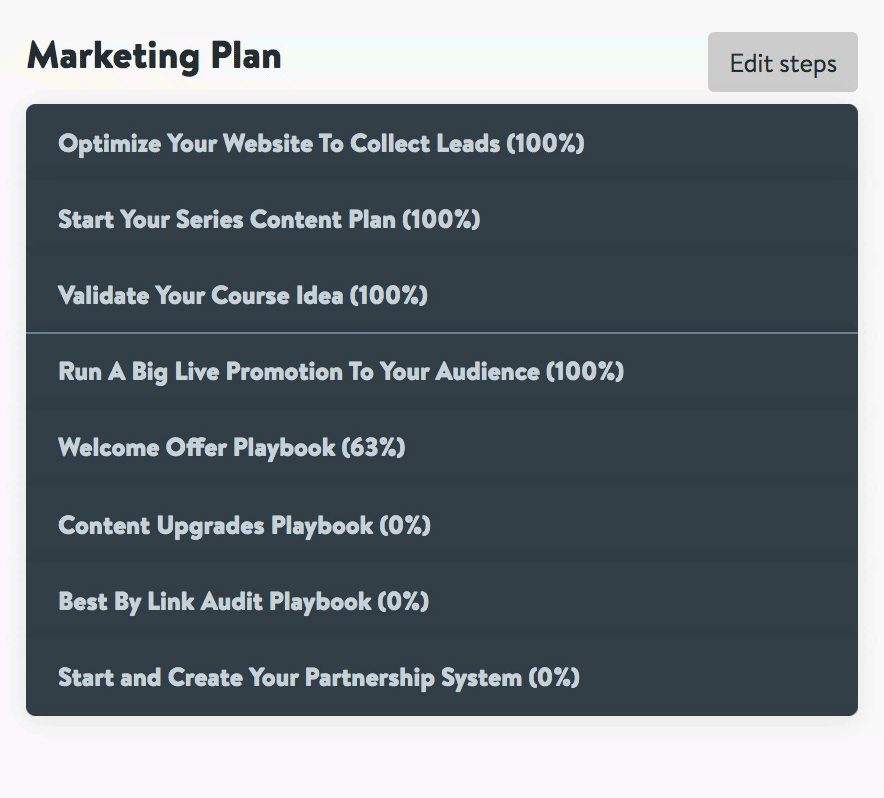| Every day, I talk to business owners who feel overwhelmed. They don't know what to focus on. The business isn't growing like they feel it should. 99% of the time, the root cause is the same: They don't have a marketing plan. A good marketing plan brings clarity and a predictable path to increased revenue. In this email, I'm going to show you the process we've refined while making 344 marketing plans for clients over the last couple years. By the end, you'll know: - One thing you MUST have before creating a marketing plan
- How to decide what to focus on first
- When and how to make adjustments to your plan
Let's do this. The #1 Rule for Creating a Marketing Plan You MUST have a growth framework at the foundation of your plan. If you don't have a core belief about how your business will grow, it's hard to make a plan that leads to growth. This framework doesn't need to be complicated. For example, I believe that almost any online business can grow to $1M by following one simple path: - Attract leads
- Teach and build trust with content
- Monetize with products
We call this Attract-Teach-Monetize, or A-T-M for short. Every plan we create has to address all three parts of A-T-M. Step #1: Find the Problem What's preventing your business from growing right now? I guarantee you it's going to fall in one of the Attract-Teach-Monetize buckets. For example, you might be creating great content but failing to attract leads. Or maybe you're great at attracting leads, but you can't figure out what to sell them. Or maybe you have a great product, but no existing audience to sell it to. You get the idea. To pinpoint the problem (or problems), we have our clients complete a 33-point assessment. The assessment forces you to get clear on everything that matters: revenue, traffic, leads, audience relationship, the purpose of your business, your #1 goal, and more. It's too big for a screenshot, but this should give you an idea. :) 
If you're trying to plan without getting clear on this stuff first...stop. You will be amazed at how much easier it gets when you look at your business from 10,000 feet. Step #2: Use Playbooks and Action Items Just like there's a "Core Path" we believe leads to growth (A-T-M), there are specific strategies we believe work best for each stage of that path. Each strategy has its own Playbook. Each Playbook is made up of Action Items. 
(By the way, you can explore a public version of this Playbook right here.) To build a Marketing Plan, we schedule the right Playbooks in the right order based on the client's unique needs and priorities. For example, here's a high-level look at the Playbooks we chose for a client who was getting good traffic, but hadn't launched a product yet: 
It's heavy on strategies in the "Teach" and "Monetize" categories since he wasn't having any issues attracting leads. BUT...notice that the first Playbook actually is focused on attracting leads (Optimize Your Website to Collect Leads). That's because of Step #3... Step #3: Layer Quick Wins on Top You know what sucks? Blindly following a Marketing Plan for months before you see a measurable positive result. Quick wins build momentum. Quick wins build excitement. Quick wins make you feel like you can take on the world. That's why we ALWAYS look for opportunities to bake them in at the beginning. In the previous example, our client had gotten 5,895 unique visitors in the last month. But he'd only converted 254 of them into leads (4% conversion rate). We believed he could double that conversion rate by making a handful of basic optimizations. That's the kind of quick-win that makes attacking the rest of the plan feel like a cakewalk. Step #4: Adjust Every 90 Days A good Marketing Plan can flex and pivot when changes and opportunities appear. Some people will disagree with this, but if your plan DOESN'T require tweaking by 90 days...you're just not executing fast enough. That's why every 90 days we always revisit our clients' Marketing Plans with a handful of questions in mind… - What worked well?
- What didn't work well?
- What were the biggest sources of traffic and leads?
- What's changed? (You know, like did a global freaking pandemic happen?)
- What else should we implement?
90-Day Reviews are the little hinges that can swing big doors. .
.
. That's how we do things. What about you? Do you have a Marketing Plan you're implementing right now? I'm always curious to see how others do them. Hit reply on this email and let me know how you're approaching it.
-Bryan |
Post a Comment